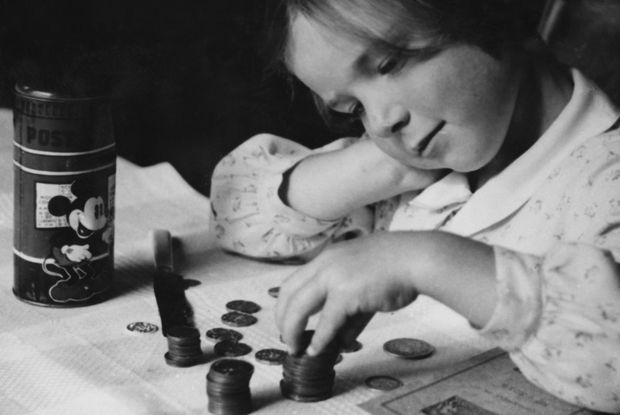On the one hand, perhaps he should only be thinking about football, Minecraft, his Lego Millennium Falcon and whether he is actually capable of magic. On the other, I can’t let this window of opportunity go by.
Being five-years-old is a prime time for learning about the world and how things work. It might seem a bit too young to be dulling his imagination with compound interest, but it’s a lesson he probably won’t get at school (unfortunately) and is one he would do well to get sooner rather than later.
That’s why I’ve started giving my five-year-old son £2 pocket money every week for the completion of very minor tasks, such as keeping his room tidy and getting himself dressed.
He’s had a piggy bank for ages that we used to just dump spare change in. We’d empty it periodically and go to Sainsbury’s to buy Hot Wheels. He gets that money buys things. That’s the easy part. The hard part is equating that to effort and understanding that the benefit of patience is potentially more money, which means more choice and more power over his own life.
Now he knows which coins are more valuable, and that he has to work for the higher denominations. He is able to understand that the longer he saves, the bigger and better the reward. He is learning that earning is linked to personal effort and that it is a good idea to have goals in mind to motivate himself.
If the average age at which children start buying things online is 10, according to the wonderful Personal Finance Education Group (pfeg), then five-years-old is probably about the right amount of preparation time. I’ll do the same when the younger one reaches five, too.
It’s hardly sending them up a chimney, but hopefully they’ll be that little bit better prepared for the world when the time comes for them to pass that most cursed of milestones: the age at which it is possible to obtain credit from a UK financial institution.
Fear of my boys getting into insurmountable debt is a big motivator.
The UK unsecured debt mountain is troubling both the Bank of England and the Financial Conduct Authority. Unsecured borrowing on credit cards, personal loans and other credit has been rising at around 10 per cent year-on-year – the highest since 2005, ahead of the financial crisis.
Young people are sucked into the debt cycle as soon as they turn 18 through student loans, unless they are blessed with extremely generous and wealthy parents. For ‘millennials’, those under 34, debt is unavoidable and normal. The average student debt is £44,000. In case you read that too quickly and its significance didn’t quite sink in, let me repeat: graduates start their working lives already £44,000 in the red. Many may never pay it off.
That’s not right and we shouldn’t accept it. One of the best ways of challenging this inevitable, steady descent into impossible-to-escape debt is to both save on behalf of our children and help them generate their own savings. It’s easier said than done, but at least the younger you are when they start, the less you have to contribute to make a difference.
I’m not stopping at pocket money. I might well start a pension fund for the kids when they reach seven, too. Which? says you a 21-year-old needs to put in £131 a month to have a big enough pension pot. If they start at seven, perhaps £40 or so a month would be enough to crack that nut.
It’s not that I want to protect them from the harsh realities of life. But rather, just to feel like they are confident enough to manage it themselves from the very beginning, not decades down the line when they have their own families and stacks of debt.
A lack of financial confidence has big, real world consequences. My own dear parents ended up divorced because, between them, they couldn’t stay afloat. They were useless with money. My dad was constantly in debt and my mum didn’t know what to do about it except work herself into the ground. The only talk of money in our household was laden with stress. What I took from that was that money = problems.
Mental illness is another consequence of a lack of financial confidence. One of the first questions counselling websites ask is ‘are you struggling with money?’ such is the strength of the correlation between financial problems and depression.
The more I see of the impact poor money management has on people’s lives, the more convinced I am that teaching infant school-age kids about it – its power, its flaws, its tricks – is one of the best things we can do for them. Teenagers are too know-it-all. Five-year-olds are happy to be told.
I don’t want either of my children to turn into money-mad mercenaries who place mammon above love.
But I don’t want them to ever feel their heart race and their mood sink because they get a bill they can’t afford to pay. I hope that a few little lessons now, through pocket money and other practical examples, plus a bit of a well-earned boost from time to time, will help keep their mind off money and on the important stuff.
Rebecca O’Connor is the founder of Good With Money and a former financial writer at The Times






Comments